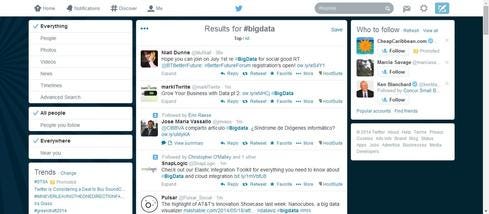Geeks, jocks, or anything else -- if you have too many, it's a problem.


10 Big Data Pros To Follow On Twitter
10 Big Data Pros To Follow On Twitter (Click image for larger view and slideshow.)
IT organizations tend to celebrate the geek -- and deservedly so. But for CIOs to build the right kinds of teams to meet current business challenges, they need to start creating more diverse cultures. This movement isn't about dumping people with ironic T shirts or pocket protectors, but about instilling a kind of diversity that leads to productivity and innovation.
The goal is to break out of hiring habits that define your culture by personality traits rather than skillsets and mindsets. A recent article in the Harvard Business Review, "The Trouble with a 'Jock Culture' at the Office," points to the same problem in a different field: sales. In the article, former CEO Jim Dougherty highlights the danger of assembling a sales team dominated by former athletes. In Dougherty's experience, women and other personality types felt their achievements wouldn't be recognized and that they wouldn't be promoted. They felt their ideas were not valued as much as their jock peers, and they weren't included in many of the conversations where business decisions were made.
Whether your company's culture is one of jocks or geeks doesn't matter -- many of the same issues hold true. Both cultures tend to exclude women. Consider that the STEM fields employ twice as many men as women. And according to this study by the Census Bureau, most of the growth of women in STEM came between the 1970s and the 1990s.
[Good leaders earn pizza. Read Pizza & Leadership: 4 Lessons.]
Consider this example of a major geek company: Google just admitted it has a diversity problem, as only 17% of its technology employees are female. Google is also predominantly white and Asian, employing very few Hispanic or black engineers. One Google senior VP of people operations went so far as to say, "Put simply, Google is not where we want to be when it comes to diversity, and it's hard to address these kinds of challenges if you're not prepared to discuss them openly, and with the facts."
It isn't only about racial or gender diversity -- obviously, there are geeks of every gender and race. And it isn't that geeks are bad -- they're delightful (and I count myself among them, and I even write a weekly column dedicated to them). The issue is homogeneity. As Dougherty pointed out concerning jock culture, a single-minded culture destroys conversation, engagement, and innovation, and it sublimates the minority voices (of all types) in your company.

Not every IT department is stuck in the geek culture, because not every IT pro is a geek. And not every department celebrates the culture, even if it's full of geeks. One way to tell if this is your problem is to check out some of the following descriptions of IT pros by Paul Glen, author of Leading Geeks: How to Manage and Lead the People Who Deliver Technology (Jossey-Bass, 2002). IT pros often:
Value other persons of similar knowledge and can be intolerant of others (without the same knowledge)
Are attracted to this business solely by the technology and tend to work on technology for technology's sake, not necessarily for business's sake
Tend to view data centers and networks as their own personal toy boxes and/or creations of their own artwork
Are introverted by nature, choosing machines over humans and facing challenges in effective day-to-day formal and informal communications
If you see these traits in your IT culture, you've got a problem. Not only is it counter to your mission to serve and drive the business, but it also means you have the type of homogeneous culture that's threatening innovation and creativity in your department.
So how do you address the problem? First, think about diversity in all forms: race, gender, age, mindset, skillset, social background, and education. Research suggests, for example, that racial diversity and gender equality both lead to greater innovation and productivity as well as overall business performance. Social diversity should do so as well, although this type of culture is admittedly hard to define and research.
Second, pay attention to the types of people you hire, particularly for management positions. If you find yourself hiring the same types of people (former athletes or former mathletes, for example), re-think your reasoning. Dougherty explains that there was a reasonable mindset behind creating the original jock culture in his company's sales department -- the previous manager thought that the teamwork and the striving through adversity of sports made for better workers. There's nothing wrong with that concept. It's only a problem when it overrides your other hiring priorities.
Third, and most important, make sure you aren't suppressing the other voices in your organization because "the crowd" does. If you surface the different voices in your department, you'll give them the confidence to speak up and you'll be rewarded with a richer pool of ideas.
When Dougherty gave voice to the workers previously pushed aside at his company, he found a remarkable impact: "… these workers began to shine. They'd been working at about 70% of their capacity, they told us. Once they were convinced the culture was changing and realized they could be promoted and rewarded, they worked harder. Productivity soared. When a few thousand people increase their productivity by 30%, it has a meaningful impact."
Are you ready to make a meaningful impact on your department? Surface as many types of workers as possible. Celebrate the differences on your team. If you do, you might find you get the best out of your geeks and jocks, millennials and boomers, and everyone else on your team.
Our InformationWeek Elite 100 issue -- our 26th ranking of technology innovators -- shines a spotlight on businesses that are succeeding because of their digital strategies. We take a close at look at the top five companies in this year's ranking and the eight winners of our Business Innovation awards, and offer 20 great ideas that you can use in your company. We also provide a ranked list of our Elite 100 innovators. Read our InformationWeek Elite 100 issue today.
About the Author(s)
You May Also Like







